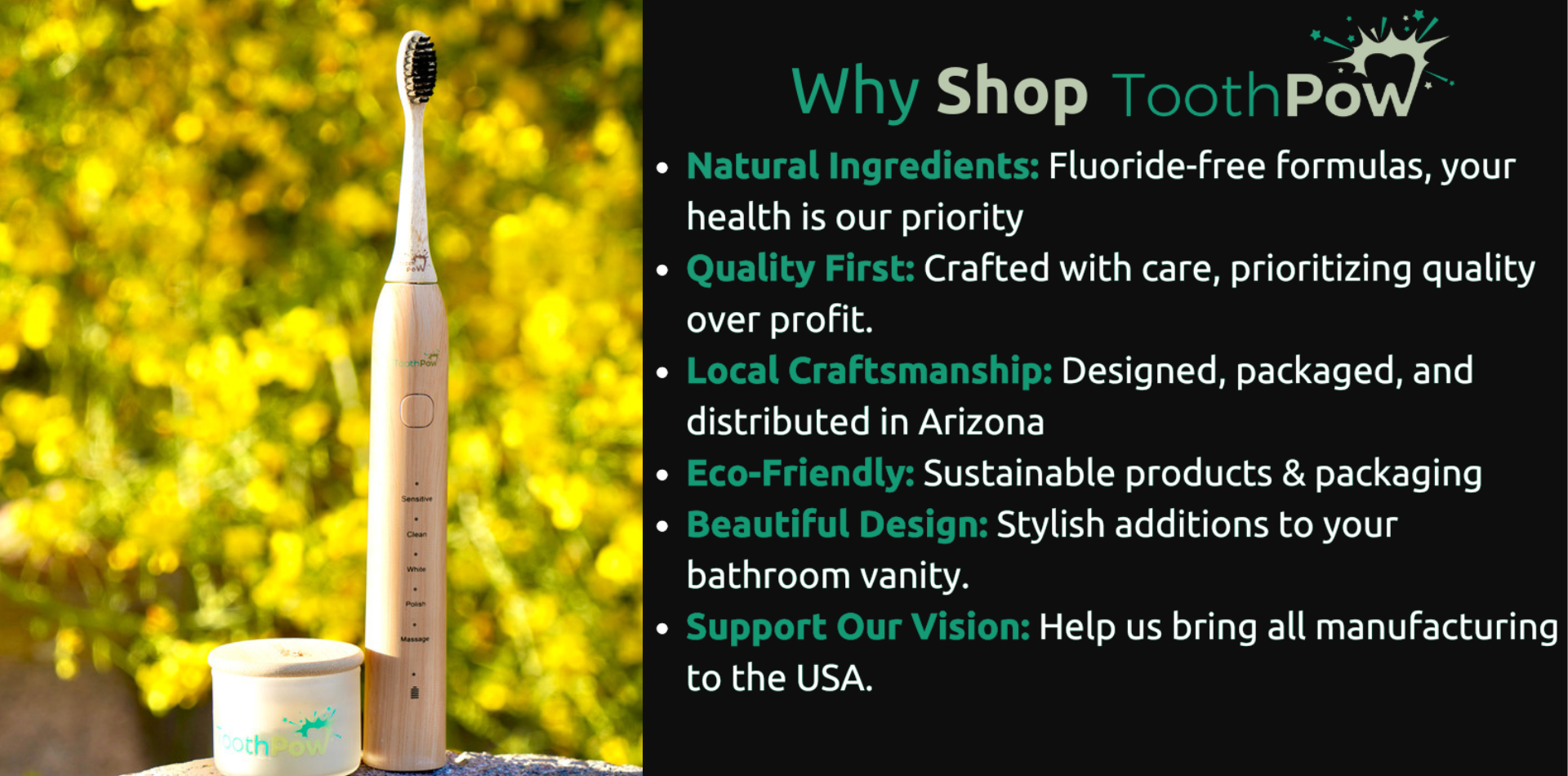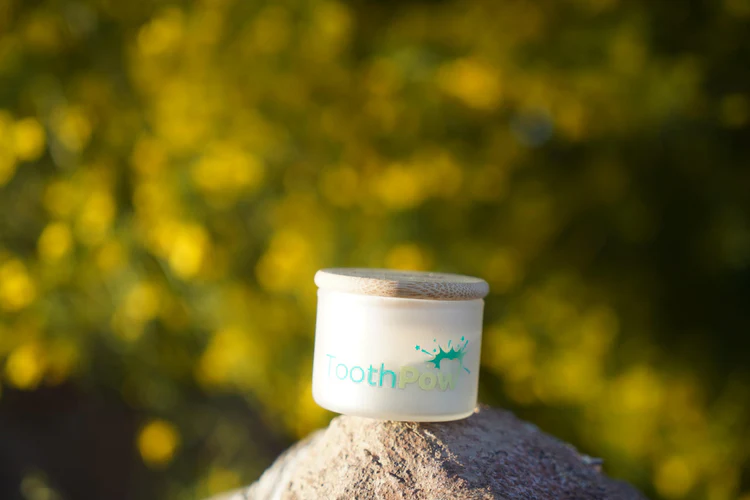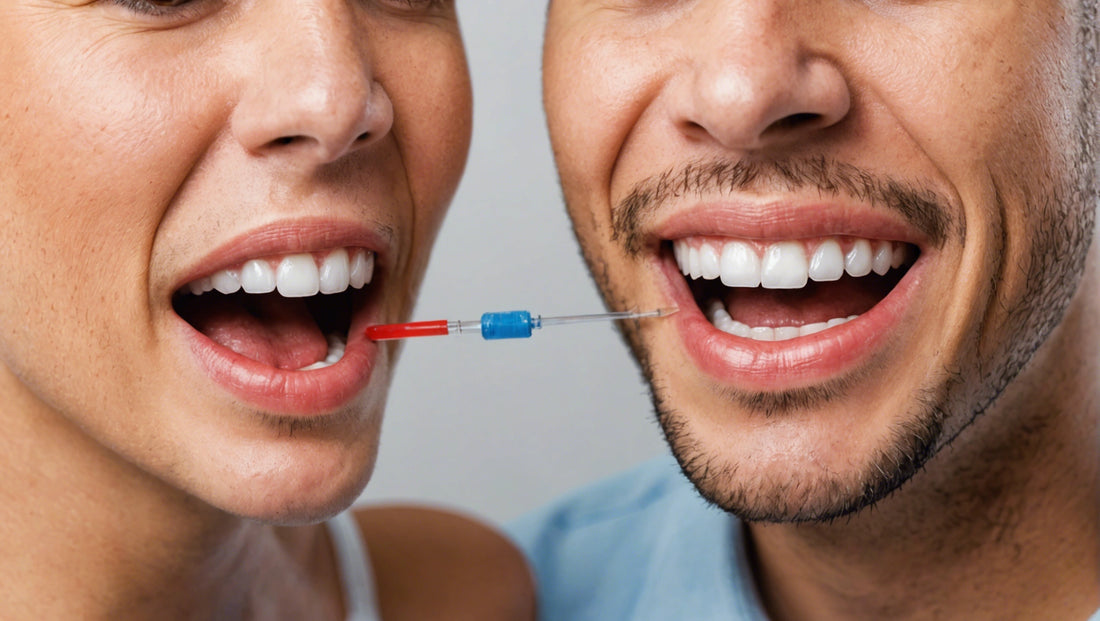Introduction
Maintaining a balanced pH level in your mouth is crucial for overall oral health. The pH level in your mouth can influence the condition of your teeth and gums, impacting everything from enamel strength to bacterial growth. A balanced pH helps protect your teeth from decay and your gums from disease, while an imbalanced pH can lead to a variety of oral health issues. This article explores the impact of pH levels on oral health and provides practical tips for maintaining a healthy pH balance in your mouth, with a focus on how ToothPow's unique formulation can help.

Understanding pH Levels and Oral Health
pH is a measure of how acidic or alkaline a substance is, on a scale from 0 to 14. A pH of 7 is considered neutral, below 7 is acidic, and above 7 is alkaline. The normal pH range in the mouth typically falls between 6.2 and 7.6, with an ideal level being around 7. Maintaining this balance is essential because it helps protect your teeth and gums from damage and disease.
Saliva plays a critical role in maintaining pH balance by neutralizing acids produced by bacteria in the mouth. It also helps wash away food particles and provides essential minerals that keep the enamel strong. When the pH balance in the mouth shifts towards acidity, it creates an environment conducive to tooth decay and gum disease. On the other hand, a balanced or slightly alkaline pH can protect against enamel erosion and reduce the risk of cavities.
How pH Levels Affect Oral Health
Impact of Low (Acidic) pH Levels
When the pH in the mouth drops below 5.5, the enamel on your teeth begins to demineralize or dissolve. This demineralization weakens the enamel and increases the risk of cavities. Acidic pH levels can also lead to gum irritation and inflammation, contributing to periodontal disease. Regular consumption of acidic foods and beverages, such as citrus fruits, soda, and wine, as well as conditions like dry mouth and poor oral hygiene, can cause these low pH levels.
Impact of High (Alkaline) pH Levels
While less common, an overly alkaline environment in the mouth can also impact oral health. Higher pH levels can help reduce enamel erosion and lower the risk of cavities by neutralizing harmful acids. However, if the pH is too high, it can lead to the formation of tartar, which can cause gum irritation and disease if not properly managed.
Causes of Imbalanced pH Levels in the Mouth
Diet and Acidic Foods/Drinks
Foods and drinks high in acids, such as citrus fruits, soda, and wine, can lower the pH in your mouth, leading to enamel erosion and cavities. Regular consumption of these items disrupts the natural pH balance, making it harder for saliva to neutralize the acids.
Dry Mouth (Xerostomia)
Saliva is essential for maintaining a balanced pH. Dry mouth, or xerostomia, reduces saliva production, which can increase the acidity in your mouth. This condition can be caused by certain medications, medical treatments, or health conditions.
Poor Oral Hygiene
Failing to maintain proper oral hygiene can lead to the buildup of plaque and bacteria, which produce acids that lower the pH in your mouth. Regular brushing and flossing help remove these harmful substances, keeping the pH balanced.
Medical Conditions and Medications
Certain medical conditions, such as gastroesophageal reflux disease (GERD) and diabetes, can affect the pH balance in your mouth. Additionally, some medications can reduce saliva production, leading to increased acidity.
Symptoms and Signs of pH Imbalance
Recognizing the symptoms and signs of pH imbalance in the mouth can help you take proactive steps to restore balance and maintain oral health. Here are some common indicators of an imbalanced pH:
Tooth Sensitivity
One of the early signs of pH imbalance is increased tooth sensitivity. This occurs when the enamel starts to erode, exposing the underlying dentin, which is more sensitive to temperature changes and acidic foods.
Bad Breath
An imbalanced pH can lead to bad breath, as the acidic environment promotes the growth of odor-causing bacteria. Persistent bad breath despite good oral hygiene may indicate an issue with your mouth's pH levels.
Gum Inflammation
Acidic pH levels can irritate and inflame the gums, leading to gingivitis and, if left untreated, periodontal disease. Signs of gum inflammation include redness, swelling, and bleeding during brushing or flossing.
Visible Enamel Wear
Erosion of the enamel due to low pH can become visibly noticeable, with teeth appearing more translucent or thinner at the edges. This wear and tear make teeth more susceptible to decay and sensitivity.
Testing and Monitoring pH Levels in the Mouth
Methods to Test Oral pH at Home
You can test your oral pH at home using pH test strips, which are available at most pharmacies. To use these strips, place one in your mouth, allow it to absorb your saliva, and then compare the resulting color change to the provided pH scale. This simple test can give you a quick indication of your mouth's pH balance.
Professional Testing and Recommendations
During routine dental checkups, your dentist can measure the pH level of your saliva and provide recommendations for maintaining a healthy pH balance. Professional testing is more accurate and can offer insights into underlying causes of pH imbalance, allowing for targeted treatments.

How to Balance pH Levels in the Mouth
Dietary Adjustments
Foods to Avoid
Acidic foods and drinks, such as citrus fruits, soda, and wine, can lower the pH in your mouth and erode enamel. Limiting these items in your diet can help maintain a more neutral pH.
Foods that Promote Balanced pH
Certain foods can help neutralize acids and promote a balanced pH in the mouth. Dairy products like milk and cheese are rich in calcium and phosphate, which help remineralize teeth. Vegetables like leafy greens and nuts also contribute to a healthier oral environment.
Tip: Drinking water throughout the day helps wash away food particles and acids, maintaining a neutral pH in your mouth.
Hydration and Saliva Production
Importance of Hydration
Staying hydrated is crucial for maintaining saliva production, which is essential for balancing pH levels. Saliva neutralizes acids and provides minerals that strengthen enamel.
Promoting Saliva Production
Chewing sugar-free gum or sucking on sugar-free candies can stimulate saliva production. Xylitol, a natural sweetener found in some gums, not only promotes saliva flow but also helps reduce cavity-causing bacteria.
Oral Hygiene Practices
Toothpaste and Mouthwash Choices
Choosing the right oral care products is vital for maintaining a balanced pH. ToothPow toothpaste, with a pH of 7.83, is formulated to help maintain a neutral pH while effectively cleaning your teeth. Avoiding products with harsh chemicals can also prevent disruptions to your mouth's natural pH balance.
Brushing and Flossing Techniques
Brushing your teeth at least twice a day and flossing daily helps remove plaque and food particles that can lower pH levels. Using a soft-bristled toothbrush and gentle brushing techniques can prevent enamel erosion and gum irritation.
Natural Remedies and Lifestyle Changes
Oil Pulling
Oil pulling with coconut oil can help reduce bacteria and promote a balanced pH in the mouth. Swishing a tablespoon of coconut oil for 10-20 minutes daily can improve oral hygiene and support pH balance.
Green Tea
Rinsing your mouth with unsweetened green tea can provide antioxidant benefits and help maintain a healthy pH level. Green tea has anti-inflammatory properties that support overall oral health.
Stress Management
Stress can affect your oral health by contributing to conditions like bruxism (teeth grinding), which can wear down enamel. Managing stress through exercise, meditation, or other relaxation techniques can indirectly support a balanced pH.
The Role of ToothPow in Maintaining Balanced pH

ToothPow toothpaste plays a crucial role in maintaining a balanced pH in the mouth. With its carefully formulated ingredients and pH level of 7.83, ToothPow helps neutralize acids, strengthen enamel, and support overall oral health.
Balanced pH with ToothPow
ToothPow's pH of 7.83 is ideal for maintaining a neutral environment in your mouth. This balanced pH helps protect your teeth from acid erosion and reduces the risk of cavities and gum disease. Using a toothpaste that maintains a neutral pH can significantly improve your oral health.
Ingredients Supporting pH Balance
Nano-Hydroxyapatite: This mineral mimics the natural composition of tooth enamel, helping to remineralize and strengthen teeth. It fills in microscopic cracks and fissures, providing a smoother and more resilient surface.
Kaolin Clay: Known for its gentle cleaning properties, kaolin clay helps remove plaque and stains without being abrasive. It supports a healthy pH balance by gently cleaning your teeth and maintaining the integrity of the enamel.
Xylitol: This natural sweetener inhibits the growth of cavity-causing bacteria and helps maintain a neutral pH. Xylitol reduces the production of acids by bacteria, protecting teeth from decay.
Benefits of Using ToothPow
Using ToothPow as part of your daily oral care routine offers several benefits:
Enamel Protection: The natural ingredients in ToothPow help strengthen and protect enamel, reducing sensitivity and the risk of cavities.
Neutral pH Maintenance: ToothPow's formulation helps maintain a balanced pH in your mouth, preventing acid erosion and promoting overall oral health.
Natural and Safe: ToothPow is free from harsh chemicals and artificial additives, making it a safe choice for those looking to avoid fluoride and other synthetic ingredients.
Incorporating ToothPow into your oral care routine can help you achieve and maintain a healthy pH balance, supporting a brighter, healthier smile.
Frequently Asked Questions about pH and Oral Health
What is the ideal pH level for the mouth?
The ideal pH level for the mouth is around 7, which is neutral. A pH level between 6.2 and 7.6 is generally considered healthy.
How can I test my oral pH at home?
You can test your oral pH at home using pH test strips. Place a strip in your mouth, wait for it to change color, and compare it to the provided pH scale.
What foods should I avoid to maintain a balanced pH?
Avoid acidic foods and drinks such as citrus fruits, soda, and wine, as they can lower the pH in your mouth and erode enamel.
Can drinking water help balance my oral pH?
Yes, drinking water throughout the day helps wash away food particles and acids, maintaining a neutral pH in your mouth.
Is ToothPow suitable for maintaining pH balance?
Yes, ToothPow toothpaste, with a pH of 7.83, is designed to help maintain a neutral pH in your mouth. Its natural ingredients support a healthy pH balance and overall oral health.
Conclusion
Maintaining balanced pH levels in your mouth is crucial for protecting your teeth and gums from damage and disease. By understanding the impact of pH on oral health and adopting practices to balance it, you can improve your oral hygiene and enjoy a healthier smile. ToothPow toothpaste, with its balanced pH and natural ingredients, offers an effective solution for those seeking to maintain optimal oral health. Embrace these strategies to keep your mouth healthy and your smile bright.

